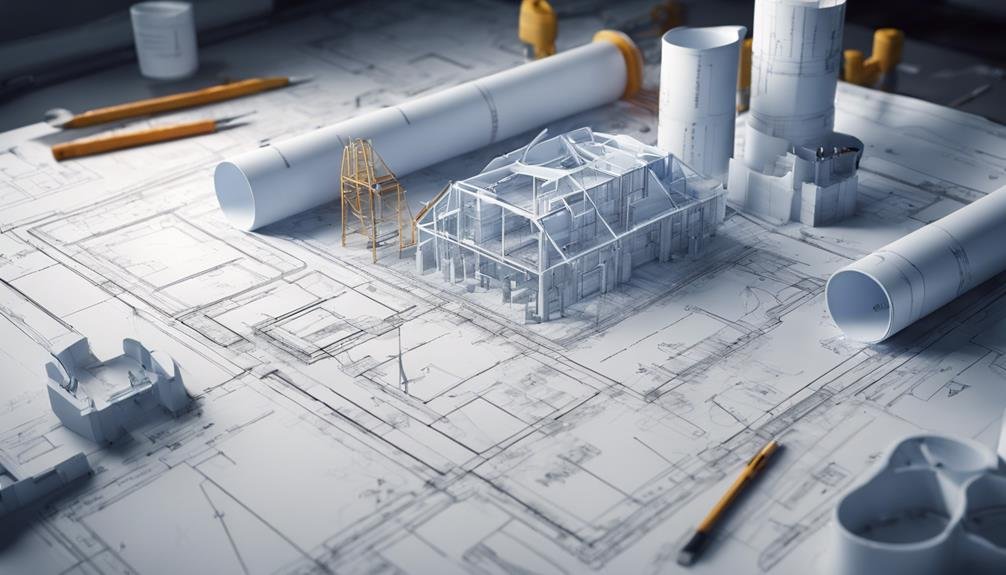Crafting a Career Development Plan in Construction
Crafting a stellar career development plan in construction begins with evaluating your skills and interests. Identify strengths and passions to align with clear career goals. Evaluate skill gaps and prioritize training needs. Build a robust professional network through events and online platforms. Seek mentorship for valuable insights. Explore diverse job opportunities in the industry to broaden horizons. Embrace technology and innovation to stay competitive. Regularly assess and adjust your plan to guarantee progress. Your path to success in construction awaits with a well-crafted career development plan.
Key Takeaways
- Identify strengths and passions.
- Set clear career goals aligned with skills.
- Assess training needs and prioritize.
- Build a strong professional network.
- Embrace technology and innovation for growth.
Importance of Career Development in Construction
Crafting a successful career in the construction industry requires a proactive approach towards career development, as it plays a pivotal role in shaping your professional growth and opportunities for advancement. Career advancement in construction is directly linked to how well you develop and enhance your skills. In this dynamic field, staying ahead requires a continuous commitment to improving your abilities and knowledge base. Skill enhancement isn't just about acquiring new skills but also about honing existing ones to stay relevant in a competitive industry.
To achieve career advancement in construction, you must actively seek opportunities to expand your skill set. This could involve pursuing further education, obtaining certifications, or gaining on-the-job experience in different areas of construction. By investing in skill enhancement, you increase your value to employers and open doors to new career prospects. Remember, in construction, the more versatile and skilled you are, the greater your chances for career growth and advancement.
Assessing Your Skills and Interests
Evaluating your skills and interests is an essential step towards crafting a successful career development plan in construction. Analyzing strengths allows you to leverage what you excel at, while exploring passions helps you find fulfillment in your career.
Here's how you can effectively appraise your skills and interests:
- Identify Your Strengths: Reflect on tasks or projects where you have excelled in the past. Consider technical skills like project management or specific trade skills, as well as soft skills like communication or problem-solving.
- Explore Your Passions: Think about what aspects of construction truly excite you. Whether it's designing structures, managing teams, or working hands-on with tools, pinpointing your passions can guide you towards a more satisfying career path.
- Seek Feedback: Ask colleagues, mentors, or supervisors for their input on your strengths and areas where you excel. External perspectives can provide valuable insights into your skills and interests that you may not have considered.
Setting Clear Career Goals
In order to make progress in your construction career, it's crucial to clearly define your career objectives. Setting specific goals helps you establish milestones and create a roadmap for your professional growth.
Regularly tracking your progress against these goals will keep you focused and motivated in achieving success.
Define Career Objectives
Defining clear career objectives is essential in mapping out a successful path in the construction industry. To set yourself up for career advancement and goal setting, it's vital to align your objectives with your skills and interests.
Here's how you can define your career objectives effectively:
- Reflect on Your Passions: Identify what aspects of construction work you're most passionate about to set meaningful career goals.
- Assess Your Skills: Conduct a thorough assessment of your current skills and areas for improvement to align your objectives with your capabilities.
- Set Specific Goals: Establish clear and achievable career objectives that outline where you want to be in the construction industry in the short and long term.
Establish Milestones
Reflecting on your career objectives in construction, the next step is to establish clear milestones that will guide your path towards achieving those goals effectively. Setting specific milestones allows you to track progress and stay motivated.
Celebrating achievements along the way is important for maintaining momentum and boosting morale. Recognizing these milestones not only acknowledges your hard work but also provides a sense of accomplishment.
Additionally, periodically revising your timeline and making progress adjustments are essential. This guarantees that you're on the right track and allows for flexibility in response to changing circumstances.
Track Progress Regularly
Establishing a routine for evaluating and monitoring progress regularly towards set career goals in construction is crucial. Progress tracking ensures you are on the right path and making advancements. Regular development reviews help identify areas for improvement and celebrate achievements.
Key points to keep in mind include:
- Setting specific milestones to measure progress effectively.
- Using tools like performance evaluations or feedback sessions for self-assessment.
- Adjusting your career development plan as needed based on insights gained from tracking progress.
Identifying Training and Development Needs
To enhance employee performance and efficiency, it's essential to analyze the specific skill gaps within your construction team through a thorough assessment process. Identifying these gaps is fundamental for effective skill development and ensuring that your team is equipped with the necessary competencies to excel in their roles.
Begin by conducting individual assessments to pinpoint areas where employees may need additional training or support. This could involve evaluating technical skills, communication abilities, leadership potential, or any other relevant competencies required in the construction industry.
Once you have identified these training and development needs, prioritize them based on urgency and impact on overall performance. Consider creating personalized development plans for each team member to address their specific gaps and provide tailored growth opportunities. Additionally, explore various training methods such as workshops, courses, on-the-job training, or mentoring programs to support skill enhancement effectively.
Building a Professional Network
To advance your career in construction, consider attending networking events where you can connect with industry professionals and potential mentors.
Utilize online platforms like LinkedIn to expand your network and stay updated on industry trends.
Remember to nurture and maintain professional relationships by staying in touch and offering help when needed.
Networking Events Importance
Attending networking events in the construction industry is vital for expanding your professional network and creating valuable connections. Networking strategies and event etiquette play an essential role in making the most out of these opportunities. When you actively engage in these events, you can establish industry connections that may lead to potential job referrals.
Here are some key reasons why networking events are important:
- Opportunity to meet industry professionals: Interacting with professionals from various sectors of the construction industry.
- Exchanging knowledge and insights: Sharing experiences and gaining valuable insights from others.
- Building a reputation: Establishing yourself as a proactive and engaged professional within the industry.
Online Platforms for Networking
Exploring various online platforms can be an effective way to expand your professional network in the construction industry.
Engaging in virtual networking allows you to connect with a broader range of industry professionals, exchange insights, and discover new opportunities.
Platforms like LinkedIn, industry-specific forums, and construction networking websites offer avenues to establish digital connections with potential collaborators, employers, and mentors.
By actively participating in online discussions, sharing relevant content, and reaching out to individuals in your field, you can enhance your visibility and credibility within the construction community.
Building a strong online presence through these platforms can help you stay updated on industry trends, gain valuable insights, and ultimately advance your career in construction.
Maintaining Professional Relationships
Building and nurturing professional relationships is essential for expanding your network and advancing your career in the construction industry. To excel in this area, consider the following:
- Networking Strategies: Actively participate in industry events, join professional organizations, and leverage social media platforms like LinkedIn to connect with professionals.
- Relationship Building: Invest time in getting to know your colleagues, clients, and industry peers on a personal level to establish trust and rapport.
- Communication Skills and Networking Etiquette: Master the art of effective communication, active listening, and maintaining professionalism in all interactions to leave a lasting positive impression.
Seeking Mentorship and Guidance
To advance effectively in your construction career, consider connecting with experienced professionals who can provide valuable mentorship and guidance. Seeking mentorship offers numerous benefits, including gaining insights from someone with more experience, receiving constructive feedback, expanding your professional network, and enhancing your chances of career advancement. However, there are also challenges such as finding the right mentor match, setting clear expectations, and balancing your mentorship commitments with your workload.
| Mentorship Benefits | Mentorship Challenges |
|---|---|
| Gain valuable insights | Finding the right mentor match |
| Receive constructive feedback | Setting clear expectations |
| Expand professional network | Balancing mentorship with workload |
| Increase chances of career advancement | Time constraints |
| Develop new skills and knowledge | Communication barriers |
To find industry mentors, consider reaching out to professionals at industry events, joining mentorship programs, utilizing online platforms, or asking for recommendations from colleagues. Building strong mentorship relationships can greatly impact your career growth and help you navigate challenges in the construction industry effectively.
Exploring Diverse Job Opportunities
Consider broadening your horizons in the construction industry by investigating a variety of job opportunities that align with your career goals and skill set. To make informed decisions about your career path, staying updated on the job market and industry trends is crucial. Here are some key points to keep in mind:
- Job Market: Research the current demand for different construction roles in your area or the areas where you aspire to work. Understanding which positions are in high demand can help you tailor your skill development efforts accordingly.
- Industry Trends: Stay abreast of the latest developments and emerging technologies shaping the construction sector. Being aware of industry trends can give you a competitive edge when exploring job opportunities and planning your career trajectory.
- Networking: Connect with professionals in various construction roles to gain insights into their experiences and learn about different career paths within the industry. Building a strong network can open doors to diverse job opportunities that you may not have considered otherwise.
Embracing Technology and Innovation
For a successful career in construction, embracing technology and innovation is essential to stay competitive in the industry and enhance your skill set. Technology integration plays a pivotal role in modern construction projects. By adopting innovative tools and software, you can streamline processes, improve efficiency, and deliver projects more effectively. Embracing Building Information Modeling (BIM) or drone technology, for instance, can revolutionize how construction projects are planned and executed.
Moreover, innovation adoption is crucial for keeping up with industry growth. Construction is evolving rapidly, with new materials, methods, and sustainability practices emerging constantly. By staying abreast of these innovations, you position yourself as a valuable asset to any construction team. Whether it's implementing green building techniques or utilizing advanced project management software, being open to innovation demonstrates your adaptability and commitment to professional growth. Embrace technology and innovation in construction to not only advance your career but also contribute to the industry's progress.
Evaluating and Adjusting Your Plan
Evaluate your career development plan regularly to confirm its alignment with industry trends and your professional goals. By evaluating progress and adjusting goals as needed, you can guarantee that your plan remains effective and relevant in the dynamic construction industry.
Here are some key steps to help you evaluate and adjust your career development plan:
- Assess Your Current Position: Reflect on your current role, skills, and accomplishments to determine if you're on track to meet your career objectives.
- Research Industry Trends: Stay informed about the latest advancements, regulations, and best practices in the construction field to identify areas where you can grow and develop.
- Seek Feedback: Engage with mentors, colleagues, or industry experts to gain valuable insights and perspectives on your career development plan.
Conclusion
Congratulations on crafting your career development plan in construction! Now that you've assessed your skills, set clear goals, identified training needs, and built a network, you're well on your way to success.
Remember, in this ever-evolving industry, embracing technology and seeking diverse opportunities are key. Keep evaluating and adjusting your plan to stay ahead of the game.
With determination and a strategic approach, your future in construction looks brighter than ever. Keep building, both literally and metaphorically!







